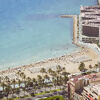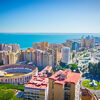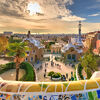15 Nights | Europe
About Horta, Spain
You will visit the following 8 places:

Alicante
Alicante is a port city on Spain’s southeastern Costa Blanca, and the capital of the Alicante province. The area around Alicante has been inhabited for over 7000 years. The first tribes of hunter gatherers moved down gradually from Central Europe between 5000 and 3000 BC. Some of the earliest settlements were made on the slopes of Mount Benacantil. By 1000 BC Greek and Phoenician traders had begun to visit the eastern coast of Spain, establishing small trading ports and introducing the native Iberian tribes to the alphabet, iron and the pottery wheel. By the 3rd century BC, the rival armies of Carthage and Rome began to invade and fight for control of the Iberian Peninsula. The Carthaginian general Hamilcar Barcaestablished the fortified settlement of Akra Leuka (meaning "White Mountain" or "White Point"), where Alicante stands today. The city is popular for its stunning beach views, nightlife, hotel resorts and festivals.

Málaga
Málaga is a large city in the southern Spanish region of Andalucia and capital of the Malaga Province. The largest city on the Costa del Sol, Malaga has a typical Mediterranean climate and is also known as the birthplace of famous Spanish artist Pablo Picasso. The city offers beaches, hiking, architectural sites, art museums, excellent shopping and cuisine. While more laid back than Madrid or Barcelona, Malaga is still the center and transport hub for the hugely popular Costa del Sol region, which is flooded with tourists in the summer, and the city has certainly cashed in on the sun and sand, with lots of new construction as well as hotels and facilities geared to tourists. However, Malaga also offers some genuinely interesting historical and cultural attractions in its old city and its setting on the coast is still beautiful.

Tampa
Tampa is a Gulf Coast Bay city in the U.S. state of Florida. It serves as the county seat for Hillsborough County. Tampa is located on the west coast of Florida. The population of Tampa in 2000 was 303,447. According to the 2009 estimates, the city's population had grown to 343,890, making it the 54th largest city in the United States. The current location of Tampa was once inhabited by various indigenous cultures, most recently the Tocobaga. It was spotted by Spanish explorers in the early 16th century, but there were no permanent American or European settlements in the area until 1824, when the US Army established a frontier outpost called Fort Brooke at the site of today's Tampa Convention Center. The village of Tampa began as a small group of pioneers who settled near the fort for protection from the Seminole population in the area.

Barcelona
Barcelona – Spain's enchanting capital, second largest and most populous city. It is a huge city that vibrates with life, and there’s certainly not another city in the country to touch it for its sheer style, looks or energy. It is one of the world's leading tourist, economic, trade fair and cultural centers, and its influence in commerce, education, entertainment, media, fashion, science, and the arts all contribute to its status as one of the world's major global cities. Barcelona is home to masterpieces of many great architects – the most famous of which is Antoni Gaudí.

Key West
Key West is an island in the Straits of Florida on the North American continent at the southernmost tip of the Florida Keys. It is considered the southernmost city in the continental United States. The city also occupies nearby islands and portions of nearby islands. It’s popularly known for its stunning beaches, coral reefs – destinations for diving and snorkeling.

Ponta Delgada
Ponta Delgada is the largest municipality and administrative capital of the Autonomous Region of the Azores in Portugal. It is located on São Miguel Island, the largest and most populous in the archipelago. Cruise ships on repositioning voyages between North America and Europe often call there. Cruise-ship visitors to Ponta Delgada will often drive out into the countryside for visits to small villages and natural volcanic wonders. There's usually time afterward for a relaxed amble through the lovely port city, noted for its squares paved with black and white tiles, fabulous churches, and public buildings with their white-painted facades and brown-black volcanic stone trim. Given its dimension and the diversity of facilities and services it offers, Ponta Delgada is also the place for experiencing, a true gateway to the active discovery of the Azores Archipelago, with many things to do.

Cadiz











